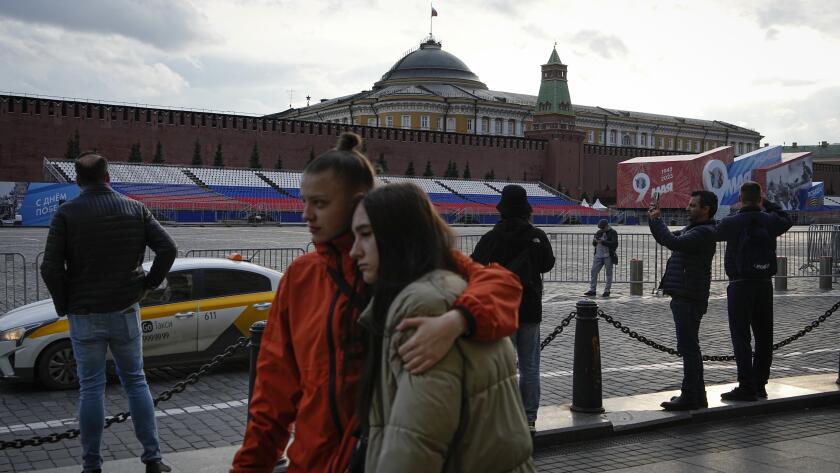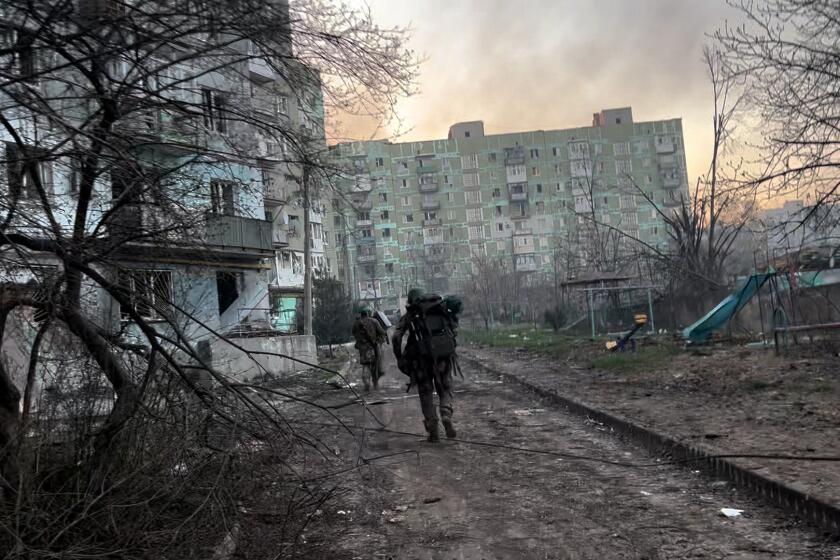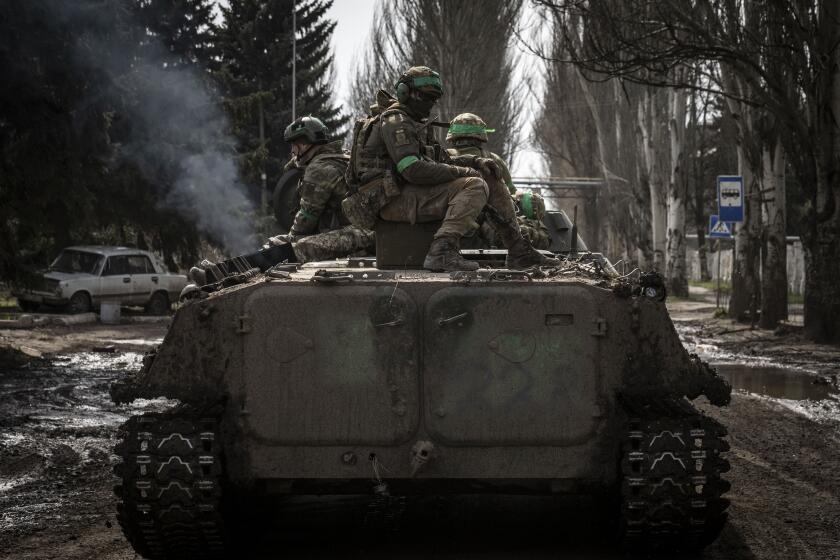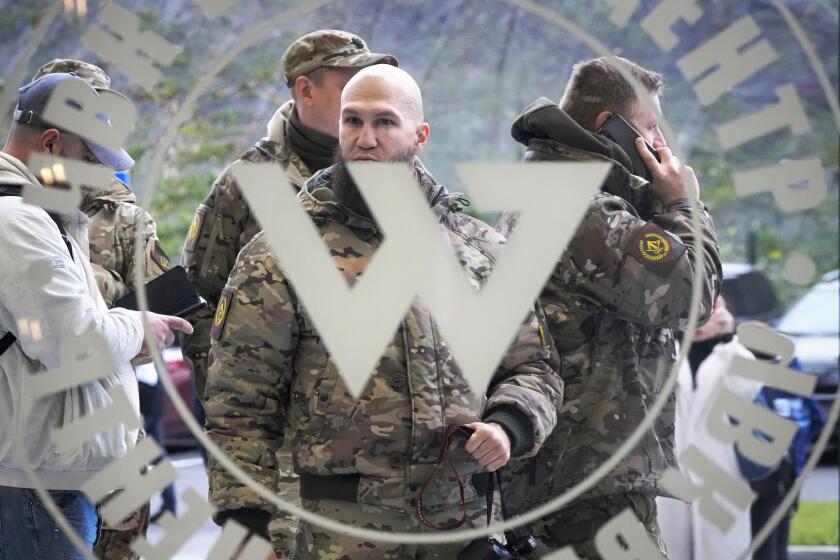Ukraine denies Russian claim it sent drones to hit Kremlin
- Share via
Russian authorities accuse Ukraine of attempting to assassinate Vladimir Putin with a drone strike on the Kremlin, giving no evidence and few details.
- Share via
MOSCOW — Russia claimed it foiled an attack by Ukrainian drones on the Kremlin early Wednesday, calling it an unsuccessful assassination attempt against President Vladimir Putin and promising retaliation for what it termed a “terrorist” act. The Ukrainian president denied it, saying: “We don’t attack Putin or Moscow.”
Putin wasn’t in the Kremlin at the time and was at his Novo-Ogaryovo residence outside Moscow, his spokesman Dmitry Peskov told Russia’s state news agency RIA Novosti.
There was no independent verification of the reported attack on the Kremlin, which Russian authorities said occurred overnight but presented no evidence in support of the claim. Questions also arose as to why it took the Kremlin hours to report the incident and why videos of it also surfaced later in the day.
A video posted on a local Moscow news Telegram channel, shot from across the river from the Kremlin, appeared to show smoke rising over the buildings. It wasn’t possible to ascertain its veracity. According to text accompanying the footage, residents of a nearby apartment building reported hearing bangs and seeing smoke around 2:30 a.m.
Another video on social media, which looks to be taken from across Red Square, appears to show the moment a drone explodes in a flash of fire above the roof of the Senate Palace in the Kremlin, near a flagpole flying the Russian tricolor, with debris falling on the roof. It also was not possible to independently verify this footage.
The Kremlin said Russian military and security forces stopped the drones before they could strike. Nobody was hurt, it added. Its official website said debris from the drones fell on the Kremlin grounds without damage.
If war is hell, there’s a credible case Bakhmut is its ninth circle, as Russia besieges the Ukrainian city that has symbolic, if not strategic, value for both sides.
Ukrainian President Volodymyr Zelensky, on an unannounced visit to Helsinki for talks with the leaders of five Nordic countries, denied any role.
“We don’t attack Putin or Moscow. We fight on our territory. We’re defending our villages and cities,” he said at a news conference.
Ukrainian presidential adviser Mykhailo Podolyak said the claims could provide a pretext for Russia “to justify massive strikes on Ukrainian cities, on the civilian population, on infrastructure facilities.”
White House Press Secretary Karine Jean-Pierre said the U.S. was “unable to confirm the authenticity” of Russia’s claim.
Asked whether the U.S. believed Putin was a lawful target of any potential Ukrainian strike, Jean-Pierre said that since the start of the conflict, the U.S. was “not encouraging or enabling Ukraine to strike beyond its border.”
U.N. deputy spokesman Farhan Haq said that the United Nations “is not in a position to confirm these reports. We strongly reiterate our call on all concerned to refrain from any rhetoric or action that could further escalate the conflic.”
The purported drone attack would be a significant escalation in the 14-month conflict, with Ukraine taking the war to the heart of Russian power.
Phillips O’Brien, professor of strategic studies at the University of St. Andrews, said, “It certainly wasn’t an attempt to assassinate Putin, because he doesn’t sleep on the roof and he probably never sleeps in the Kremlin.”
He added it was too soon to prove or disprove whether it was a Russian attempt “either to make Ukraine look reckless or to buck up Russian public opinion” or if it was a Ukrainian operation to embarrass Russia.
James Nixey, director of the Russia and Eurasia program at the Chatham House think tank, said “the two most likely possibilities are a ‘warning shot across the bows’ by Kyiv or a false-flag operation by Moscow designed to justify more intense attacks in Ukraine or more conscription.”
If it was a warning shot by Kyiv, then it was “yet another shocking security lapse by the Russian state,” he said.
“If it’s a false-flag operation by Moscow, then it reeks of desperation,” Nixey added. “And it’s a high-risk strategy likely to be exposed, considering how poor their tradecraft seems to be.”
The attack allegations immediately prompted calls in Russia from pro-Kremlin personalities to carry out assassinations on senior leadership in Ukraine.
The Kremlin claimed the attack was planned to disrupt Victory Day, which Russia celebrates in Red Square annually on May 9 to commemorate the defeat of Nazi Germany in World War II. Peskov said the parade would take place as scheduled.
Before the news about the alleged attack broke, Moscow Mayor Sergei Sobyanin issued a ban on using drones in the Russian capital, with an exception for drones launched by authorities. He gave no reason for the ban, saying only that it would prevent the “illegal use of drones that can hinder the work of law enforcement.”
As anticipation builds for a counteroffensive, Ukrainian forces are desperate to lay their hands on Western tanks that could help turn the war’s tide.
Zelensky was in Finland trying to secure greater firepower for his armed forces as they attempt to dislodge Russian troops from occupied areas of Ukraine.
Both Ukraine and Russia reportedly have experienced ammunition shortages after a winter of long-range shelling and missile strikes. Kyiv has been pressing its allies for more as officials consider when to start driving Russian forces out of Ukrainian territory they occupy.
Zelensky said Ukraine’s counteroffensive is coming “very soon.”
This year “will be decisive … for victory,” he said.
The Nordic countries — Finland, Sweden, Norway, Denmark and Iceland — have been among Kyiv’s strongest backers since Russia’s full-scale invasion of Ukraine in February 2022. Before the meeting with Zelensky, Nordic officials appeared ready to provide more aid.
“Here in the north, we have a more unpredictable and aggressive Russian neighbor, and it is important that we discuss together how to face this new situation,” Norwegian Prime Minister Jonas Gahr Store said.
Russian private military contractor Wagner is busy boosting its brand as its fighters try to subdue Ukraine, trading secrecy for war propaganda movies.
The talks came a day after U.S. officials said Washington plans to send Ukraine about $300 million in additional military aid, including an enormous number of artillery rounds, howitzers, air-to-ground rockets and other ammunition.
The weapons will be pulled from Pentagon stocks, so they can go quickly to the front lines, according to the officials who spoke on condition of anonymity because the aid has not yet been formally announced.
In fighting Wednesday, 16 civilians were killed in a “massive attack” by Russian forces on Kherson province, the prosecutor general’s office said.
Russian fire hit the train station and the only open supermarket in the southern province’s capital, also called Kherson, killing 12 people and wounding 22, officials said. Three energy workers died when they came under fire while making repairs north of the city.
Elsewhere, Russia used Iranian-made drones during its third attack on Ukraine’s capital city in six days.
Explosions were heard in Kyiv and elsewhere during the night as Ukrainian air defenses shot down 21 Russian drones, Ukraine’s air force command said. No damage or casualties were reported
Meanwhile, a massive blaze broke out at a Russian oil depot, local officials said Wednesday.
The depot erupted in flames in Russia’s southern Krasnodar region, east of the Russian-held Crimean peninsula, according to Krasnodar Gov. Veniamin Kondratyev.
He didn’t say what caused the fire, which was described as extremely difficult to put out. But some Russian media outlets said it was probably caused by a Ukrainian drone attack. There was no official comment on that possibility.
Local residents heard an explosion shortly before the fire erupted, Russian news site Baza said.
Military analysts think Ukraine is targeting supply lines in the Russian rear while gearing up for a possible counteroffensive amid improving weather conditions and as it receives more weapons and ammunition from the West.
Yevgeny Prigozhin, head of the Wagner mercenary group whose fighters are a key force in Russia’s grinding months-long battle for the eastern town of Bakhmut, was quoted by Russian media as saying Wednesday that he believes the counteroffensive is underway.
“I believe that the offensive of the Ukrainian army has, in fact, already begun. We see the highest activity of enemy aviation, we see the highest activity along the perimeter and inside our front,” he said, according to the reports.
Explosions also derailed a Russian freight train and hit a Russian airfield in recent days. Last weekend, a massive fire erupted at an oil depot in Russian-occupied Crimea after it was hit by two Ukrainian drones, a Kremlin-appointed official said.
In anticipation of a Ukrainian counteroffensive, Russian forces are focused on destroying logistical routes and centers of Ukraine’s armed forces with long-range strikes, Kyiv military officials say.
At the same time, Russia plans to continue talks with the United Nations and other parties to a wartime agreement on facilitating Black Sea agricultural shipments, Peskov said ahead of talks on Friday.
More to Read
Sign up for Essential California
The most important California stories and recommendations in your inbox every morning.
You may occasionally receive promotional content from the Los Angeles Times.













